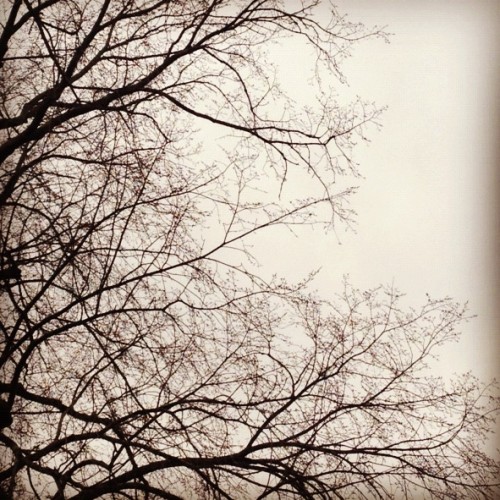
What does belief mean? What does faith mean? I am pretty sure that these are not the same as being religious in the conventional sense of the word, but I’m also sure there are large swaths of overlap.
These questions floated around the room this weekend as I looked out my office window at my tree and noticed the faint swelling at the ends of the still-black branches that tells me they are moving towards spring. I know that swelling will grow, eventually bursting into bright green bloom, in a riotous assertion of new life that will surprise me, as it does every single year. Why was I thinking about faith, about belief, about religion, as I looked at the tree branches? I don’t know but somehow it seems to make sense.
I’ve often had moments of deep emotion, as inarticulate as it is undeniable, a sensation that feels like my spirit acknowledging something external that is its equal in power and mystery. Very often these moments come over me when I’m observing the natural world, as I did through my window, or when I’m outside in it, for example sitting in my favorite cemetery or running in the pre-dawn darkness. The feeling, as I’ve described it before, is the sense equivalent of the sound of birds’ wings flapping or of lines beating against masts in the wind.
These experiences of startling awareness also form constellations around each of my children: they’ve occurred at each of their births, in their shadowy, nightlight-lit bedrooms, and at other, random moments throughout my life as their mother.
Sometimes this sensation does float over me in a classically religious setting. I’ve felt it at church, particularly when riding the swells of a congregation speaking in unison. I had an experience in the crypt at the Assisi Cathedral that I’ve never forgotten, when something buried deep inside my chest stirred. That day something was agitated inside of me that I am still struggling to understand, and it was connected, I’m sure, to my location deep inside one of the places most imbued with tangible spirituality I’ve ever been.
Moments like those make me wonder about the Venn Diagram that exists between religious fidelity and spirituality more broadly defined. I know it’s the same feeling, for me, regardless of the setting. I have spent years trying to put these encounters with something beyond rational thought into words. It’s brushing up against the eternal. It’s feeling the chill of what lies beyond this world waft by me, reminding me that each moment is essentially fragile, hugely tenuous. It’s a piercing awareness of how tiny I am in the universe, which is somehow both immensely reassuring and hugely terrifying at the same time.
What I wondered, as I stared at my tree, is how this – this thing, these encounters, this emotion, this feeling, this bigger-than-me shadow – relates to religious faith. The fact that it (how insufficient “it” is to describe what I’m talking about, but I don’t know what else to say) has visited me in church suggests maybe it has something to do with it. The truth is, though, I’m not sure. I suspect that faith, belief, and trust all spring from the same root, and together form a braid of things I desperately want more of in my life. While for some people religion may be a synonym for what I describe, I’m also certain that many people who are not traditionally religious know of what I speak.
As I stared at my tree, wondering how long I’d have to watch, without blinking, before I could actually observe the swelling of the buds, I realized it doesn’t really matter. What I want is the trust, the faith, the belief in something bigger than me, in a benevolent universe, in a design so vast. What I call it is irrelevant.
